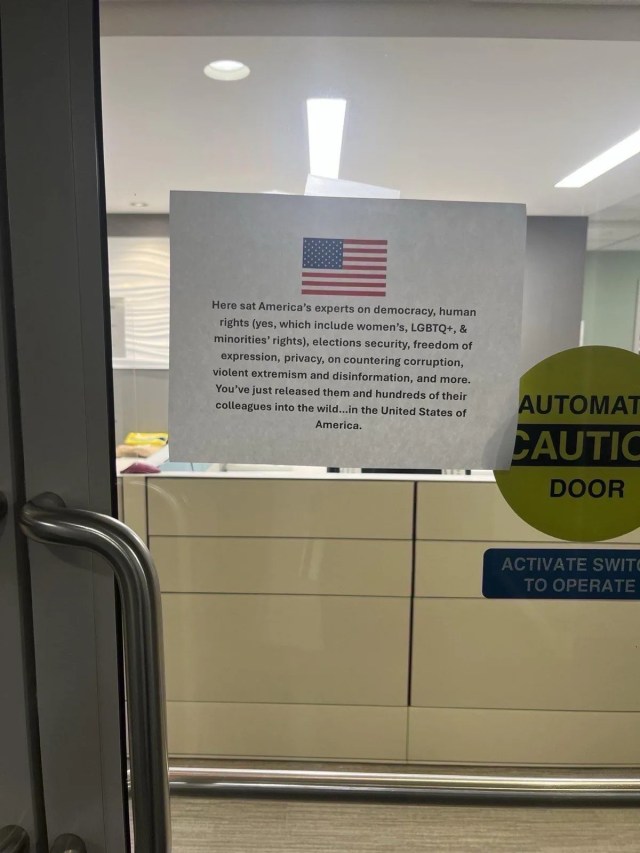It begins with a quiet image. An empty hallway, a locked glass door, behind it a printed note, simply taped to the window. No official statement, no logo, no sender – but every word a statement. It reads:
"Here sat America’s experts on democracy, human rights (yes, which include women’s, LGBTQ+, and minorities’ rights), election security, freedom of expression, privacy, countering corruption, violent extremism and disinformation – and more.
You’ve just released them – along with hundreds of their colleagues – into the wild… in the United States of America."

What looks like a quiet farewell is, in truth, a political note – taped to the door of an emptied office, somewhere in the heart of the American federal administration. The location: in all likelihood, a wing of the State Department or USAID, more precisely the former departments for democracy, human rights, and the rule of law. What once formed the backbone of American foreign policy has now been hollowed out, dismantled, silenced.
A few steps away, on a wall, hangs a second printout. Plain. Direct. No frills. It reads:
"Colleagues,
if you remain:
RESIST
FASCISM
Remember the oath you vowed to uphold."

It is an appeal to those who remain – who were not fired, transferred, or pushed out of the agency. An appeal to conscience, not to the system. And it reads like a memorial in real time.
Since Donald Trump returned to office in early 2025, hundreds of officials have been dismissed, entire departments dissolved. Most affected: those working in human rights, election observation, press freedom, extremism prevention, or anti-corruption. The "DRL" at the State Department – the Bureau of Democracy, Human Rights and Labor – was once seen as the moral compass of U.S. foreign policy. And the "DRG" at USAID – Democracy, Human Rights and Governance – as a central platform for promoting democracy worldwide. Today, these departments are effectively abolished. Their teams: dissolved, reshuffled, isolated.
Those speaking from inside report systematic transfers, revoked security clearances, internal gag orders. Some staff say their email access was cut off overnight. Others received a single instruction: Pack your desk. No conversation. No thanks. Just silence.
Yet their work was far from marginal. These were the people who protected activists in Belarus, supported election commissions in Africa, documented assaults on journalists worldwide, developed tools against online disinformation. Today they are “released,” as the personnel files say. In truth: cast out. Donald Trump speaks publicly of “purging,” of the “deep state,” of “dismantling corrupt influence.” What is disguised as administrative reform is, in reality, an ideological reconstruction: away with pluralism, away with human rights, away with international responsibility. In its place: America First – and everyone else out. But traces remain. Words on doors. Notes on walls. Lines that say more than entire press releases. And maybe that is their power. Because whoever walks through these hallways will read them. And wonder what once was here – and what should have remained.
Perhaps one day, future generations will stand here, in front of that glass door, and read:
"You’ve released them into the wild… in the United States of America."
And then understand that the retreat from human rights does not begin with loud slogans – but with the silence behind closed doors.

Mit Menschenrechten lässt sich halt kein Geld verdienen.
Die Kettensäge, die Elon Musk in Spiel brachte, sägt weiter.
Wer sich ihr in den Weg stellen könnte wird mit umgesägt.
Menschenrechte bringen nicht nur kein Geld, sie Kosten Geld.
Ohne kann man Menschen entrechten und ausbeuten.
Alles für noch mehr Gewinn der Autokraten, Diktatoren und Oligarchen.